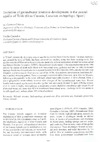Identificador persistente para citar o vincular este elemento:
https://accedacris.ulpgc.es/jspui/handle/10553/53986
| Campo DC | Valor | idioma |
|---|---|---|
| dc.contributor.author | Cabrera, M. Carmen | en_US |
| dc.contributor.author | Custodio, Emilio | en_US |
| dc.contributor.other | Cabrera, Maria del Carmen | - |
| dc.date.accessioned | 2019-02-04T19:08:25Z | - |
| dc.date.available | 2019-02-04T19:08:25Z | - |
| dc.date.issued | 2005 | en_US |
| dc.identifier.isbn | 0-415-36444-2 | en_US |
| dc.identifier.other | 2034 | - |
| dc.identifier.uri | https://accedacris.ulpgc.es/handle/10553/53986 | - |
| dc.description.abstract | A 75 km2, intensively developed coastal aquifer in eastern Gran Canaria island, Canarian Archipelago, around the town of Telde, has been surveyed and studied, using data from existing wells. The aquifer consists of Pliocene to Recent volcanic materials, with an intercalated detrital formation called Las Palmas Detritic formation (LPDF). Groundwater development in the area started late in the l9 th century by means of shaft wells fitted with horizontal water galleries and later on with horizontal drainage boreholes. Groundwater development became intensive since the 1950s. mostly for cash crop irrigation and town supply. First surveys are of the l970s. Groundwater development conditions follow a quickly changing pattern. There is a conspicuous water table drawdown, up to 40m in 20 years, following a strip parallel to the coast, although inland water table elevation is little affected. There is also a progressive water salinity increase with changes of the hydrochemical water type. Recent basalts were a good aquifer some decades ago but now are mostly drained. In spite of being considered the area as highly overexploited, groundwater reserve depletion contributes only about 5% of abstracted water, and more than 60% is transferred from inland areas. Discharge to the sea seems to be still significant, perhaps about 30% of total recharge. | en_US |
| dc.language | eng | en_US |
| dc.source | Groundwater Intensive Use / Andrés Sahuquillo; J. Capilla; Luis Martinez-Cortina and X. Sánchez-Vila ( Eds.), v. 7, p. 295-306, (2005) | en_US |
| dc.subject | 250804 Aguas subterráneas | en_US |
| dc.subject | 250621 Vulcanología | en_US |
| dc.subject.other | Volcanic terrains | en_US |
| dc.subject.other | Hydrogeology | en_US |
| dc.subject.other | Groundwater flow | en_US |
| dc.subject.other | Intensive use | en_US |
| dc.subject.other | Hydraulic properties | en_US |
| dc.subject.other | Canary Islands | en_US |
| dc.title | Evolution of groundwater intensive development in the coastal aquifer of Telde (Gran Canaria, Canarian archipelago, Spain) | en_US |
| dc.type | info:eu-repo/semantics/conferenceObject | en_US |
| dc.type | ConferenceObject | en_US |
| dc.relation.conference | Symposium on Groundwater Intensive Use | en_US |
| dc.identifier.isi | 000241418700024 | - |
| dcterms.isPartOf | Groundwater Intensive Use | - |
| dcterms.source | Groundwater Intensive Use,v. 7, p. 295-306 | - |
| dc.identifier.absysnet | 341052 | - |
| dc.description.lastpage | 306 | en_US |
| dc.description.firstpage | 295 | en_US |
| dc.relation.volume | 7 | en_US |
| dc.investigacion | Ciencias | en_US |
| dc.rights.accessrights | info:eu-repo/semantics/openAccess | - |
| dc.type2 | Actas de congresos | en_US |
| dc.identifier.wos | WOS:000241418700024 | - |
| dc.contributor.daisngid | 2942267 | - |
| dc.contributor.daisngid | 395127 | - |
| dc.identifier.investigatorRID | R-9825-2018 | - |
| dc.utils.revision | Sí | en_US |
| dc.contributor.wosstandard | WOS:Cabrera, MC | - |
| dc.contributor.wosstandard | WOS:Custodio, E | - |
| dc.date.coverdate | 2005 | en_US |
| dc.identifier.conferenceid | events120526 | - |
| dc.identifier.ulpgc | Sí | en_US |
| dc.contributor.buulpgc | BU-BAS | en_US |
| item.fulltext | Con texto completo | - |
| item.grantfulltext | open | - |
| crisitem.author.dept | GIR IUNAT: Geología de Terrenos Volcánicos | - |
| crisitem.author.dept | IU de Estudios Ambientales y Recursos Naturales | - |
| crisitem.author.dept | Departamento de Física | - |
| crisitem.author.orcid | 0000-0002-4556-4665 | - |
| crisitem.author.parentorg | IU de Estudios Ambientales y Recursos Naturales | - |
| crisitem.author.fullName | Cabrera Santana, María Del Carmen | - |
| crisitem.event.eventsstartdate | 10-12-2002 | - |
| crisitem.event.eventsenddate | 14-12-2002 | - |
| Colección: | Actas de congresos | |
Visitas
150
actualizado el 15-ene-2026
Descargas
206
actualizado el 15-ene-2026
Google ScholarTM
Verifica
Altmetric
Comparte
Exporta metadatos
Los elementos en ULPGC accedaCRIS están protegidos por derechos de autor con todos los derechos reservados, a menos que se indique lo contrario.
